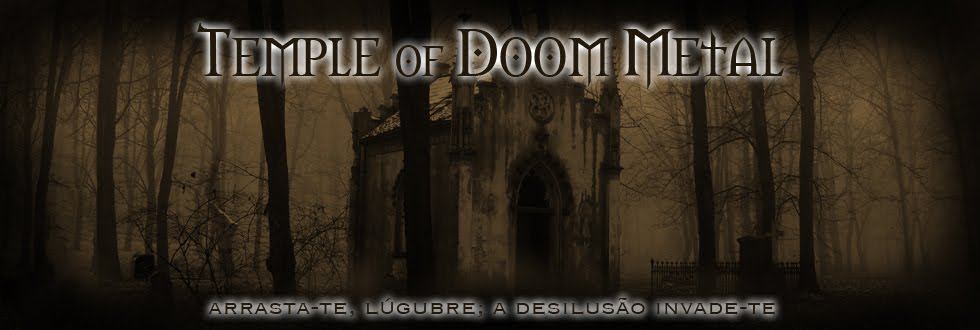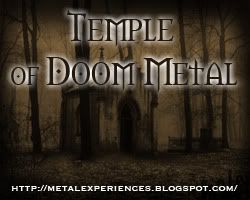Funeral Doom Metal, movimento III! 2011 vê o regresso dos moscovitas Abstract Spirit com mais um álbum, após a estreia 'Liquid Dimensions Change', de 2008, e 'Tragedy And Weeds' no ano seguinte. Quem já se cruzou - ou melhor, foi abalroado! -, com a sonoridade deste trio já sabe muito bem com o que pode contar, bastaria ler a primeira frase deste texto. Para os 'novatos', este 'Horror Vacui' acaba por ser a descoberta da banda no se u passo seguinte, ou seja, não é o aprimoramento da fórmula, com retoques aqui ou ali, mas um aprofundamento da sonoridade, com algumas novas tonalidades até aqui pouco exploradas.
A meia-dúzia de temas, mais o interlúdio de faceta ambiental 'Vigilae Mortuorum (Interludium)', que fazem parte deste trabalho parecem ainda mais lentos e guarnecidos de uma dimensão épica. Essa impressão fica logo patente na abertura, com 'Beyond Closed Eyelids', onde a par dos riffs imensos e incomensuravelmente pesados de M. Hater e da voz gutural cortesia de I. Stellarghost, surge uma maior incorporação de teclados e passagens de piano, permitindo aos temas respirarem da sua hipnótica e lenta violência, o que proporcionará ao ouvinte, por conseguinte, algum tempo para recuperar o fôlego antes de voltar a ser engolido por esta massa sonora gigantesca.
Ao longo deste 70 minutos, cai sobre nós uma negritude funérea, criando uma atmosfera doentia, comiserável, um monumento que se constrói lentamente, numa subtil e arrepiante progressão, dantesco que esbarra na nossa frente, deixando-nos com uma sensação de mal-estar perturbadora. Os coros, quais lamúrias desta ode mortífica, funcionam como leves bálsamos, momentâneos, ao longo deste trajecto por hediondas paisagens.
Este álbum resulta como um só, rochedo indivisível, esmagador, quer pela sua coerência estilística e sonora mas, também, pela cadência que os próprios temas têm, entrelaçando-se uns nos outros bastante naturalmente. Apesar disso, algo mais ressalta ao escutarmos 'Post Mortem' e 'Pulse'.
'Horror Vacui', não sendo um trabalho perfeito, nem inovador, tem no condão da sua coesão e poder sonoro e estilístico a capacidade de afirmar os Abstract Spirit como uma das melhores bandas do segmento na Rússia e na Europa, capaz de poder vir a ombrear com os alemães Ahab.
Por nós, os últimos 70 minutos do Apocalipse já têm banda-sonora. (16.3/20)
English:
Funeral Doom Metal, movement III! 2011 sees the return of Moscow Abstract Spirit with another album after the debut ‘Liquid Dimensions Change’, in 2008, and ‘Tragedy And Weeds’ in the next year. Anyone who has ever crossed - or rather, was rammed! - with the sound of this trio, knows quite well what can count on, just need to read the first sentence of this text. For the 'newbie’s', this 'Horror Vacui' turns out to be the discovery of the band at their next step, specifically, not on improving the formula, with touches here and there, but looking forward for a deeper sound with some new ideas up till now little explored.
The half-dozen tracks, plus the ambiental interlude 'Vigilae Mortuorum (Interludium)', which are part of this work seem even slower and look a bit more epic. This impression is immediately evident in the opening song, "Beyond Closed Eyelids', where side by side with immense and immeasurably heavy riffs, played by M. Hater and deep guttural voices courtesy of I. Stellarghost, there is a greater incorporation of keyboards and piano passages, allowing those songs to breathe from their slow and hypnotic violence, which will provide the listener, therefore, time to catch his breath before returning to be swallowed by this huge mass of sound.
During these 70 minutes, falls upon us a funereal blackness, creating an unhealthy atmosphere, miserable, a monument that is built, slowly, in a subtle and chilling progression, in a Dantesque way that collides against our senses, leaving us with a feeling of malaise disturbing. The choirs, which laments along this deadly ode, act as light balms, momentary, along this route by hideous landscapes.
This album turns out as one, indivisible rock, overwhelming, both for its consistency of style and sound but also by the cadence that have their own tracks, weaving them into each other quite naturally. Yet, we need to emphasize 'Post Mortem' and 'Pulse'.
'Horror Vacui', not being a perfect record, or innovative, has the knack to show a very intense cohesion and power of their sound and stylistic ability to affirm Abstract Spirit as one of the best bands in the funeral segment in Russia and in Europe, capable of being able to comparable with the Germans Ahab.
For us, the last 70 minutes of the Apocalypse have already a proper soundtrack. (16.3/20)
The half-dozen tracks, plus the ambiental interlude 'Vigilae Mortuorum (Interludium)', which are part of this work seem even slower and look a bit more epic. This impression is immediately evident in the opening song, "Beyond Closed Eyelids', where side by side with immense and immeasurably heavy riffs, played by M. Hater and deep guttural voices courtesy of I. Stellarghost, there is a greater incorporation of keyboards and piano passages, allowing those songs to breathe from their slow and hypnotic violence, which will provide the listener, therefore, time to catch his breath before returning to be swallowed by this huge mass of sound.
During these 70 minutes, falls upon us a funereal blackness, creating an unhealthy atmosphere, miserable, a monument that is built, slowly, in a subtle and chilling progression, in a Dantesque way that collides against our senses, leaving us with a feeling of malaise disturbing. The choirs, which laments along this deadly ode, act as light balms, momentary, along this route by hideous landscapes.
This album turns out as one, indivisible rock, overwhelming, both for its consistency of style and sound but also by the cadence that have their own tracks, weaving them into each other quite naturally. Yet, we need to emphasize 'Post Mortem' and 'Pulse'.
'Horror Vacui', not being a perfect record, or innovative, has the knack to show a very intense cohesion and power of their sound and stylistic ability to affirm Abstract Spirit as one of the best bands in the funeral segment in Russia and in Europe, capable of being able to comparable with the Germans Ahab.
For us, the last 70 minutes of the Apocalypse have already a proper soundtrack. (16.3/20)

 Copia e cola este banner
Copia e cola este banner
 Copia e cola este banner
Copia e cola este banner









